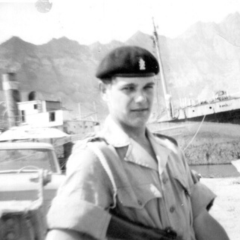Your Guide to Leaving A Legacy

Your guide to leaving a Legacy
Your Gift in Will guide
Leaving a gift in your Will can help us be here for veterans in years to come. For those currently serving, it means we can strategically plan for the future. You are making your legacy the wellbeing of future veterans.
Let us help
If you’d like to chat about the impact you can make, writing your Will or legacies, please call Sarah Seddon on 01372 587144 or email sarah.seddon@combatstress.org.uk
IMPACT OF LEGACY GIFTS

Rob, Army veteran
“Combat Stress has got me back to doing the things I enjoy. I want to say a massive thank you to Combat Stress.”

Liz, RAF veteran
“I called Combat Stress’ Helpline and there was a friendly voice at the end of the phone, making me feel like I wasn’t on the scrap heap.”

Bernard, Army veteran
“Combat Stress is a fantastic place. The team are excellent with their caring and helpful attitude.”
We are living in strange and uncertain times, but of course that is what the military are trained for, to react in an appropriate and timely manner to unexpected events, but what of their own affairs, are they as good in looking after themselves as they are of others, I wonder?
The Wills Act of 1837 must be one of the oldest laws on the statute book that is still in daily use. The Act details the requirements for making a valid Will and although it has been subsequently amended, most recently to allow for witnesses to use a video link to witness a Will, it is still largely unchanged.
There is, however, a significant exception for military personnel on active duty which simplifies the requirements to reflect the possibility of imminent death and to try to ensure that the soldier’s last wishes are honoured. However, the Act which established the concept of a privileged Will is itself over a hundred years old and society has changed out of all recognition in that time. Many of the soldier’s Wills from the First World War left everything to their Mother, these were young men and most of them lived at home, and the idea of living together before marriage was virtually unheard of. They were simple expressions of wishes written in their pocketbook - the shortest Will being “All for Mother”. Fast forward a hundred years or so and now getting on for 20% of couples live together without the formality of a marriage or civil partnership. No matter how long a couple have lived together the Intestacy Rules mean that the surviving partner is not entitled to anything on the death of their partner. Their estate falls to be distributed according to the Intestacy Rules and this could mean wider family, from whom they might even have been estranged, receiving their estate to the exclusion of their partner.
If an unmarried couple have children, then they (together with any children of the deceased from a previous relationship) will inherit the estate which could mean that the surviving partner received nothing, and they may have to consider bringing a claim against the estate (and therefore potentially their own children) under the Inheritance (Provision for Family and Dependants Act) 1975 in order to have any access to funds. At any time, this would be a daunting prospect, but the fallout would even be devastating at a time of bereavement.
Very many people put off making a Will, some think that it is tempting fate, others think that it is something they will deal with on another day, and especially now when family finances are so stretched it is simply not on a lot of people’s ‘to do’ list’. However, I have seen at first hand the heartache caused when the survivor not only has to deal with not only the grief of losing a beloved partner but then the realities of moving forward with practicalities of living. I have seen many people who were anxious about making a Will, but I can only say that, without exception, they were relieved once it was completed. It really is a last kindness to your family to have sorted out your affairs when for the time when you will not be here.
Some people put off making a Will because they don’t think that they have anyone to leave their estate to, or perhaps they don’t think they have anything much to leave, or even the fact that they don’t want to address the issue that they are alone in the world. I think this might have been the case with Jim* who was a bachelor with no close family or friends. His two interests in life were his weekly pint at the pub and giving small regular amounts to charity which he meticulously recorded in a notebook. Jim was not a wealthy man, but he owned a substantial house. When he died, the notebook was found but no Will and so his whole estate, including his house, was distributed under the Intestacy Rules to a family he did not even know that he had. I never met Jim as I only dealt with the Estate after his death, but I can remember how much I thought he would rather that the money had gone to the charities that he had supported over so many years.
Many of us lead busy lives and sometimes people’s lives are complicated, maybe with a second relationship or family disharmony and they simply put ‘their heads in the sand’ and hope that the issue will go away. Perhaps this is what Guy thought? He was a successful businessman who married for a second time and had a young family with his second wife , and grown up children from his first marriage. Both families remained on good terms but then Guy was tragically killed in a car accident without having made a Will and therefore his estate was distributed under the Intestacy Rules causing a rift between the families that had not been there before and at a time when they should have all been supporting each other and grieving together for a much-loved husband and father.
If you have made a Will it is important to review the contents every few years or when there has been a life changing event for you or one of your beneficiaries, a birth, marriage, divorce, death of a beneficiary etc, just to ensure that the Will still represents your wishes. If you have made a Will previously and subsequently updated it somewhere else, I recommend that you retrieve the earlier Will. If you made a military Will, this should be returned to you when you leave the service. Whilst the latest Will in time is the one that is valid on death it is good practice to ensure that previous Wills are gathered in to avoid misunderstandings and confusion.
Many people plan to make a Will but somehow never quite get around to is and this may have been the of case for a young Royal Marine killed in Afghanistan some years ago and whose story was reported at the time. His fiancée believed that he had made a new Will before his last deployment, but nothing was found and so under the terms of the only Will that was found after his death his sister received his whole estate which meant that the fiancée not only has lost her partner but was not entitled to anything under the terms of the Will which had been made before their engagement. This illustrates that is vital that a Will is kept up to date to reflect a change in circumstances but also that the whereabouts of the Will are known and recorded. At present in the UK there is no central register of the location of Wills.
Many charities will pay for a straightforward Will to be professionally drawn up by a solicitor in the hope that the charity supporter will leave a legacy to the charity in their Will. Most solicitors will also store the Will, usually free of charge, (but do check first) and give the client a copy to keep with their papers. Solicitors who practice in this area of law are used to dealing with all kinds of family dynamics with sensitivity and tact and can also suggest solutions to protect family assets and save Inheritance Tax if appropriate. Very often, when the time comes, the same solicitor will offer a free initial interview to the beneficiaries upon death to outline the legal formalities that need to be followed to wind up the estate.
So, what to take away from this? Make a Will, it will be a last kindness to those left behind. Ensure that the Will is professionally written, it really is well worth the relatively modest expense, home-made Wills can cause difficulties except in the most straightforward of cases. Investigate Free Will Schemes offered by charities, or if not, ask for a quotation for the preparation of a Will which all solicitors are obliged to give before commencing work on a matter. Keep a copy of the signed Will with your papers and ensure that your loved ones know where the original is held. Remember, whilst a Will does not have a ‘sell by date’ circumstances change, take a few minutes to review the Will every few years, or when there has been a life changing event, just to confirm that it still represents your wishes, you should also be aware that a Will is automatically revoked on marriage, unless it has been made in contemplation of marriage.
*not their real names
September 2022

Elizabeth Neame is a retired Private Client Solicitor, a Graduate of the University of Bristol who practised in the area of making Wills, Estate Planning and Probate. When practising she was a member of STEP, the Society of Trust & Estate Practitioners, a specialist organisation in this aspect of the law. Elizabeth frequently talks on the subject and was a Visiting Lecturer in Law for BPP University in Bristol.
